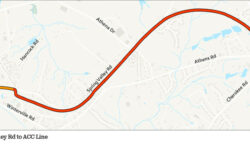Athens-Clarke County officials are looking at revamping stormwater management. Residents could be getting more help from the government with flooding on their property, but depending on how commissioners decide to fund the program, they could wind up paying higher fees as well.
Currently, ACC focuses on flooding on public streets and minimizing pollution from stormwater runoff. The program is funded by a mix of sales taxes for infrastructure and a stormwater management fee charged to property owners based on their amount of impervious surface like parking lots, minus credits for mitigation like rain gardens or green rooftops.
“Are we doing enough stuff?” Transportation and Public Works Director Drew Raessler asked. “Are we charging the right amount? Are we giving enough credits?”
Commissioners ordered a review of the program in March 2017, and the county hired the global consulting firm Stantech, which provided options for funding and expansion at a work session last week.
“Stormwater is hard to talk about, because it’s so diffuse,” said Stantech’s Bill Zieburtz. “We’re all part of creating water-quality impacts.”
An online survey taken by 300 people and feedback from two public hearings found broad support for stormwater management among the public, but some confusion about sources of the problem. While 37 percent of people said they have stormwater issues on their property, only 11 percent believed they’re contributing to stormwater problems downstream.
Not everyone is aware of the need to maintain detention ponds or ditches on their property. “Things are going undone,” Williams said. Part of the problem is that people in low-income suburbs might not have the resources, Link said.
Commissioner Jerry NeSmith said one of his constituents complained about a neighbor cutting down trees, but the trees turned out to be around a detention pond and had to be cleared by law. “The No. 1 problem is educating the citizens about what their responsibilities are, what they own and what they have to take care of,” NeSmith said.
Or the government could do it for them—but that would cost money and could create risk for ACC. Already, ACC manages 355 miles of drainage pipes, 4,000 manholes, 320 miles of ditches, 13,000 catch basins and 653 outflows. Nearly $100 million in maintenance projects are on the horizon, Zieburtz said.
One option for expanding service would involve hiring more employees and buying more equipment or hiring contractors to inspect, clean and maintain county infrastructure. An even higher level of service would address problems on privately owned easements.
The stormwater utility fee the commission created in 2005 to fund federally mandated stormwater management averages about $42 a year. If ACC officials decide to expand the program or stop funding it with SPLOST, that fee would rise to $56 or $72, on average.
The commission originally created the fee—while cutting property taxes—so that entities like UGA, schools and churches that don’t pay taxes but contribute to stormwater issues would pay their fair share. Zieburtz said that funding method is increasingly common, especially in college towns, because it’s more equitable.
Raessler asked the commission to vote on a level of service in November, before voting on a funding source next spring. But commissioners weren’t ready to decide last week. “This is taking a long time to process,” Commissioner Allison Wright said. “I don’t know if we need another work session for your answer. I think so.”
Like what you just read? Support Flagpole by making a donation today. Every dollar you give helps fund our ongoing mission to provide Athens with quality, independent journalism.









